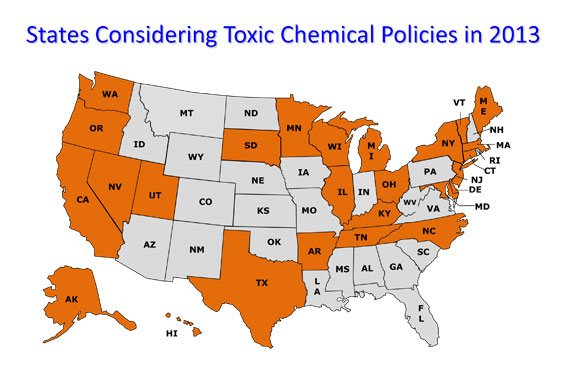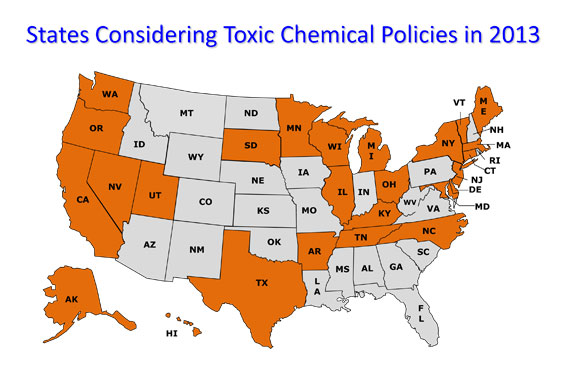26 States to Consider Toxic Chemicals Legislation in 2013
 The following post was originally published at Safer States.
The following post was originally published at Safer States.
By Sarah Doll, National Director for Safer States
Despite intense industry opposition and Congressional inaction, state governments continue to defend the public from toxic chemical exposure.
Each year, state legislatures continue to prove that they are the leaders in protecting public health from toxic chemicals. In the past ten years, 19 states have adopted more than 93 chemical safety policies and this year, they are looking to make more change.
In 2013, we expect at least 26 states to consider legislation and policy changes that will:
- Restrict or label the use of bisphenol A (BPA) in receipts, children’s products and food packaging.
- Require removal of certain toxic flame retardants from children’s products, home furniture or building materials.
- Change disclosure rules so that concerned consumers will have a way to identify toxic chemicals in products.
- Encourage manufacturers to remove identified toxic chemicals in favor of safer alternatives.
- Ban cadmium, a dangerous, persistent metal that is often found in inexpensive children’s jewelry.
- Ban formaldehyde from cosmetics and children’s products.
- Promote green cleaning products in schools.
We have seen that state laws snowball into changes in national toxic chemical policy. In 2012, so many states had passed laws banning BPA from baby bottles and sippy cups that manufacturers gave up their fierce battle against bans and removed the toxic chemical from all such products nationwide.
We are now looking to effect the same change with more toxic chemicals and more products. And although it’s early in the year, we’re already seeing momentum toward increased BPA oversight in Suffolk County, New York and Maine (more info).
But the fight will continue to be tough. Every step of the way, the Safer States coalition has been, and will continue to be, met with tough opposition from the chemical industry, which is backed by billions of dollars in influence. “The chemical lobby, just like the tobacco industry before it, has impeded serious regulation and is even trying to block research,” said
Nick Kristof this week in a New York Times article which discusses chemicals that may be contributing to obesity.
One focus of state legislatures will be Tris flame retardants, which are probable carcinogens and found in products made of foam, including baby sleep products and couches. The chemical has become infamous because of the chemical industry’s intense misinformation campaign uncovered last year by the Chicago Tribune.
Every legislative session, I hear stories from coalition partners about opposition lobbyists who make backroom deals with legislators, spread misinformation about toxic chemical effects and threaten economic impacts that have never come to fruition.
That is why I am proud that states continue to fight, and continue to pass laws and policies which lighten the toxic chemical burden that our families, loved ones and community carry.
Highlights of state legislation in 2013 include:
Bans on Toxic Flame Retardants. At least 15 state legislatures will consider policies to phase out the use of toxic flame retardants, including chlorinated Tris in consumer products such as children’s products and home furniture. States considering policies to restrict exposure to toxic flame retardants include Alaska, Arkansas, California, Connecticut, Hawaii, Illinois, Maine, Massachusetts, Maryland, New Jersey, North Carolina, New York, Vermont, Washington, Wisconsin.
Identification and Disclosure of Chemicals Harmful to Children. At least 14 states, including Alaska, Connecticut, Delaware, Illinois, Maine, Maryland, Massachusetts, Michigan, Minnesota, New York, Nevada, Oregon, Vermont, and Washington will consider policy to identify chemicals of concern for children’s health and require makers of consumer products to disclose their use of the chemicals. Many of these bills and rule changes include provisions to encourage manufacturers to identify and use safer alternatives in their products.
BPA Phase Outs. At least 15 states will consider policy to restrict or label the use of the hormone-disrupting chemical Bisphenol A (BPA) in infant formula cans, food packaging—especially for babies—and receipt paper, including Arkansas, Connecticut, Hawaii, Kentucky, Massachusetts, Maine, Minnesota, New Jersey, New York, North Carolina, Ohio, South Dakota, Tennessee, Texas, and Utah are all states that will consider such legislation.
Laws need to continue to be passed in the states because the federal handling of toxic chemicals is so flawed. The Toxic Substances Control Act (TSCA)—the law that “oversees” toxic chemical regulation nationally—is now 37 years old, and it does not even require basic health and safety data on chemicals before they are used in products.
Senator Frank Lautenberg (D-NJ) introduced an overhaul to TSCA in the last Congress, but despite passing its first committe vote, the bill failed to cross the finish line. The bill is expected to be re-introduced in 2013. The Safe Chemicals Act is supported by the Safer Chemicals, Healthy Families coalition, which is made up of over 450 groups, including American Nurses Association, the American Sustainable Business Council, and the Breast Cancer Fund. However, opposition from the American Chemistry Council in particular has so far succeeded in obstructing passage.
“Unfortunately, the American Chemistry Council has engaged in a campaign of intimidation and double speak at the national level that would make the tobacco industry blush,” said Andy Igrejas of Safer Chemicals, Healthy Families. “As long as tobacco-style attack politics hold sway in Washington, state legislatures are the only folks with the power to step up and protect public health.”
The Safer States Coalition, made up of groups of environmental advocates, physicians, nurses, parents, and concerned citizens looks forward to a successful 2013—a year that we hope will continue the pattern of more disclosure of toxic chemicals, and more consideration of safer alternatives in our everyday products.
About the author: Sarah Doll, mother of an adorable four-year old, is the national director of SAFER states, a coalition of state-based organizations championing solutions to protect public health and communities from toxic chemicals.




